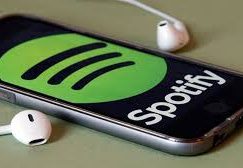Spotify aims to defund classical musicians
NewsThe genius Swedes behind the failing online streaming service have decided not to pay any royalty on tracks that are accessed less than 1,000 times a year.
Many of these minority tracks will be classical.
Spotify say the aim is to reduce fraud.
Most think the aim is to reduce paying artists.
That’s not nice.






That should, of course, be completely illegal.
Just when I was wondering what to do with the .003 cents per play I was already “not getting” because I didn’t meet the $10.00 threshold….
At Spotify’s normal reimbursement rate that probably adds up to less than $1, so not really worth the staff time to administer payment.
Unfortunate but not surprising move by a company always finding new ways to nickel and dime artists. That said, I think our author is being a bit optimistic when he describes Spotify as “failing.” Sure, lots of us classical connisseurs use other services, but in pop, rock, etc. Spotify still has an enormous slice of the market share.
What services would you recommend for classical music please?
Radio please Martial. Musicians are paid under “ equitable remuneration “ law when their works are broadcast. The higher the audience figures the better the payments.
Naxos Music Library. YouTube. Apple Music if you have Apple equipment.
I find everything I need, in all genres, on YouTube. Might splurge on the ad-free version.
…. And do you really imagine you tube pays classical musicians anything?
Spotify treats artists of all genres as garbage. This is disgraceful.
If the other comments are indications of what classical musicians earn from Spotify, maybe they should simply not grant them rights to their material at all, rather than Spotify granting themselves free use. If the plays are that low, no-one is missing out. If the earnings are that low, no-one is missing out.
If plays are that low, shouldn’t societies save the millions they pour into these obsolete organizations and that produce stuff LITERALLY nobody wants to hear, and rather address other things more valuable/pressing?
CLOSE. THE. ORCHESTRAS!
Sonic sinfonia you do not understand the situation I’d you believe every musician owns the rights to every recording they appear on….that is not what being a professional musician entails.
Sorry typo! “ if you believe “
Yes, it’s horrible. Now try getting on any of the other platforms, Apple, Amazon, etc. Are the terms any better there, even if they initially agree to let you on?
I subscribe to Qobuz; are they are better? (A genuine question, by the way.)
What is the scenario where that reduces fraud?
How doe the fraud work?
The fraud is on Spotify. They are the fraudulent party. When the musicians decide that it’s a waste of time and money to be on Spotify and other non-paying platforms, things will change.
Herr Forkenspoon working professional musicians do not own the rights to their recordings the record labels do. They get no say if they are “on Spotify”. They would love the law on equitable remuneration which pays them when their recordings are broadcast to catch up with the digital era and pay them likewise for streaming.
This is why I generally do not use commercial streaming services for classical music. The major exception is YouTube which carries a good deal of Baroque music from Arte, or from Sebastian Dauc’e’s magnificent Ensemble Correspondances (they have their own channel there).
There are two new initiatives at play for 2024 and this one noted above is not about reducing fraud. It’s about giving more money to working musicians who deserve it. If your music isn’t being listened to at least 1000 times per year, it’s essentially being ignored by the public. The time and money it takes to administer royalties for these tracks is better spent elsewhere.
Presumably, most of the specific royalty administration is done by computer, with humans involved only in attributing royalties in the first place (a one-off process for a given track, although I wonder if even that is done by humans, to be honest) and dealing with disputes. So, unless you want to argue that server CPU time and storage is too precious to handle data on small royalties (an argument that might have made sense back in the days when a computer was the size of a room and had less processing power than a modern mobile telephone), the “time and money” argument is untenable.
Other organisations manage it… for all its faults, the PRS do keep records of small royalty amounts (assuming that they actually hear about the performance at all, that is — their /modus operandi/ of taking samples is very problematic) and make payouts when a sufficient amount has accrued to make a bank transfer to the rightsholder’s account feasible. If the PRS can do it, so can Spotify (which has the benefit of far more comprehensive usage data for its remit).
So I will unsubscribe Spotify from now on
Thank you. You and me both.
The vast majority of classical musicians never earn a penny from Spotify. If a symphony orchestra recording is streamed the only musician to be paid is the contracted featured artist, the conductor who ironically is the one person who didn’t contribute a sound to the recording!
That is what the (then) Australian Broadcasting Commission did in the 1950s when broadcasting performances by outside opera companies. No fee for the conductor on the grounds he could not be heard.
This has to be one of the most poorly informed posts in this site.
a) spotify’s YOY return is +165%. Failing? Whst is failing is certain website full of adware that looks like a blog from ghe year 2000 calling itself “the #1 classical music site”
b) Spotify’s business is mich broader than Music, with recent acquisitions and investments of podcasting where the growth comes from.
c) If somehow classical musicians are overrepresented in the group with “less than 1000 plays”…..well, what does that tell you about the importance that this “artform” has in the world?
LITERALLY nobody cares. But of course, the music industry is not at fault here, people are!
This post and many comments are a sad example of how out of touch with reality the entire classical world really is.
And this is why I buy CDs instead of using streaming services.
Spotify pay all classical musicians when their music is streamed in SPAIN. They have no choice it is the law. Featured and non- featured under “ making available “ laws all musicians are paid through their PPL accounts. ( including micropayments of 1/2 p.) Only when the UK government legally oblige the streaming companies to do the same thing in the UK will the same thing happen.
If you want artists to be paid then stop using Spotify and actually buy their music. Radical idea, eh?
If they got rid of the 30 seconds playtime to qualify for royalties and inly paid out in songs played all the way through or at least 75% through then it would not be a susceptible to fraudulent streaming.
Spotify failing with 17% subscriber growth. Failing upwards!